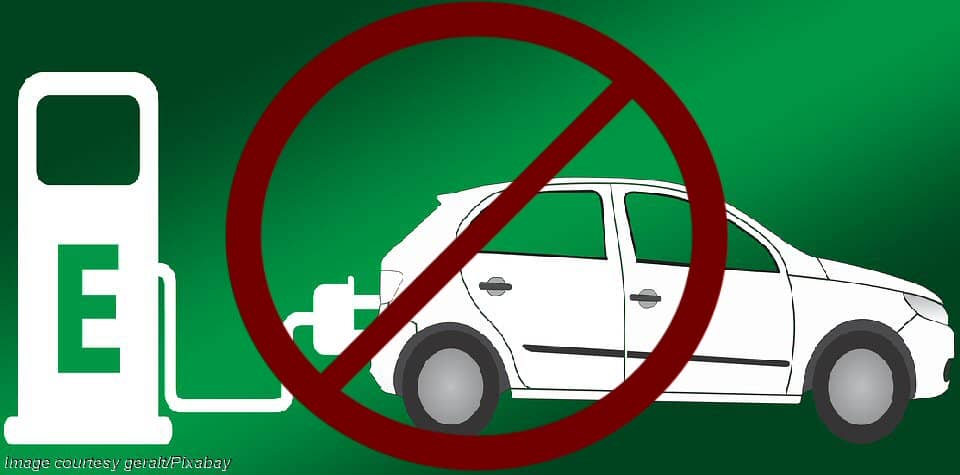Increased Opposition From Car Dealers To Mandatory EV Sales

Table of Contents
Financial Concerns and Infrastructure Readiness
The transition to an EV-centric market demands substantial investment from car dealerships, creating significant financial concerns and fueling resistance to mandatory EV sales.
Investment in New Infrastructure and Training
Adapting to the EV market requires considerable upfront investment. Dealerships must upgrade their facilities to accommodate the specific needs of electric vehicles. This includes:
- Installing charging stations: The cost of installing fast-charging stations, along with the necessary electrical infrastructure upgrades, can be substantial, varying greatly based on location and scale.
- Employee retraining: Mechanics and sales staff require specialized training to service and sell EVs, a cost often borne by the dealerships themselves. Understanding EV battery technology, charging systems, and software updates is essential.
- Inventory management: Managing EV inventory presents unique challenges. Unlike gasoline cars, EV inventory might require different storage and handling due to battery sensitivity and charging needs.
The lack of comprehensive government support or insufficient incentives for these investments exacerbates the financial burden on dealerships, contributing to their opposition to mandatory EV sales targets.
Uncertain Profit Margins on EV Sales
Dealerships also express concerns about potentially lower profit margins on EV sales compared to traditional internal combustion engine (ICE) vehicles. This is a crucial aspect of car dealer resistance to mandatory EV sales.
- Impact on dealership revenue: Lower profit margins per vehicle sold could significantly impact overall dealership revenue, especially in the initial stages of EV adoption.
- Service revenue differences: EVs typically require less frequent and less complex maintenance than ICE vehicles, potentially reducing service revenue streams for dealerships.
- Competition from direct-to-consumer EV brands: The rise of direct-to-consumer EV brands like Tesla further intensifies the pressure, as these manufacturers bypass traditional dealership networks, limiting revenue opportunities.
This uncertainty about long-term profitability makes dealerships hesitant to fully embrace EV sales mandates, affecting their willingness to invest heavily in the necessary infrastructure and training.
Sales and Consumer Demand Challenges
Beyond financial concerns, car dealers face significant challenges related to sales and consumer demand for electric vehicles, further fueling their resistance to mandatory EV sales quotas.
Limited Consumer Awareness and Range Anxiety
Educating consumers about the benefits of EVs and addressing concerns regarding range and charging infrastructure remains a significant hurdle.
- Consumer misconceptions: Many consumers still harbor misconceptions about EV technology, charging times, and overall practicality.
- Range anxiety: The fear of running out of battery power before reaching a charging station remains a major deterrent for potential EV buyers.
- Charging time and accessibility: The time it takes to charge an EV and the availability of convenient public charging stations are key concerns affecting consumer adoption.
This consumer hesitancy directly impacts dealership sales projections, adding to their reluctance to heavily invest in EVs when demand remains uncertain.
Inventory and Supply Chain Issues
Managing EV inventory presents additional challenges due to ongoing supply chain disruptions and production limitations.
- Demand exceeding supply: Current demand for EVs often surpasses supply, leading to long wait times for customers and difficulties in forecasting sales accurately.
- Longer lead times for EV orders: Ordering and receiving EVs can take significantly longer than for gasoline cars, impacting dealership inventory management and customer satisfaction.
- Difficulty in forecasting EV sales: The unpredictable nature of EV demand makes it difficult for dealerships to accurately forecast sales and manage their inventory effectively.
These logistical hurdles contribute significantly to dealer hesitancy in fully embracing mandatory EV sales targets, as they struggle to meet consumer demand reliably.
Policy Concerns and Regulatory Hurdles
Government policies surrounding mandatory EV sales also contribute to car dealer resistance, creating uncertainty and challenges.
Lack of Clarity and Flexibility in Government Mandates
The implementation of mandatory EV sales quotas often lacks clarity and flexibility, raising concerns among dealerships.
- Unrealistic targets: Some argue that the mandated targets are unrealistic, given the current pace of EV adoption and the challenges in infrastructure development.
- Lack of regional considerations: Regulations may not adequately consider the unique circumstances of different regions, particularly rural areas with limited charging infrastructure.
- Potential for penalties and fines: The fear of penalties for failing to meet mandated targets creates significant pressure on dealerships.
A more collaborative policymaking approach that includes input from the dealership industry is essential to address these concerns and ensure a smoother transition to electric vehicles.
Competition from Direct-to-Consumer EV Brands
The emergence of direct-to-consumer EV brands poses another significant challenge to traditional dealerships, influencing their resistance to mandatory EV sales.
- Reduced reliance on dealerships: Direct-to-consumer brands often bypass traditional dealership networks, reducing the role of dealerships in the sales process.
- Loss of market share: This shift threatens the market share and profitability of traditional dealerships.
- Impact on dealer networks: The success of direct-to-consumer models challenges the established business model of the dealership network.
This competitive pressure further fuels resistance to mandatory EV sales, as dealerships fear losing market share and revenue to these disruptive brands.
Conclusion: Finding Common Ground on Mandatory EV Sales
The opposition to mandatory EV sales from car dealerships stems from a complex interplay of financial, logistical, and policy-related challenges. Dealers face substantial upfront costs for infrastructure upgrades and employee training, uncertainty about profit margins on EV sales, and difficulties in managing inventory and meeting consumer demand. Furthermore, unclear and inflexible government regulations, along with competition from direct-to-consumer brands, add to their concerns.
Addressing the concerns surrounding mandatory EV sales requires a balanced approach that considers the needs of all stakeholders. Open dialogue, supportive government policies that include adequate financial incentives, and clear communication between policymakers and the car dealership industry are crucial. Let's work towards fostering a successful transition to electric vehicles by finding solutions that support both government objectives and the viability of car dealerships. Open dialogue about mandatory EV sales is crucial for a sustainable future.

Featured Posts
-
 Kompany Onder Vuur Zware Kritiek Na Vernederende Nederlaag
May 12, 2025
Kompany Onder Vuur Zware Kritiek Na Vernederende Nederlaag
May 12, 2025 -
 Mtv Movie And Tv Awards Canceled For 2025 Official Announcement
May 12, 2025
Mtv Movie And Tv Awards Canceled For 2025 Official Announcement
May 12, 2025 -
 From Bellator To Ufc Manon Fiorots Rise After Early Setback
May 12, 2025
From Bellator To Ufc Manon Fiorots Rise After Early Setback
May 12, 2025 -
 L Humoriste Eric Antoine De Nouveau En Couple Decouvrez Sa Nouvelle Compagne
May 12, 2025
L Humoriste Eric Antoine De Nouveau En Couple Decouvrez Sa Nouvelle Compagne
May 12, 2025 -
 Reaccion De Boris Johnson Ante Ataque De Avestruz En Texas
May 12, 2025
Reaccion De Boris Johnson Ante Ataque De Avestruz En Texas
May 12, 2025
